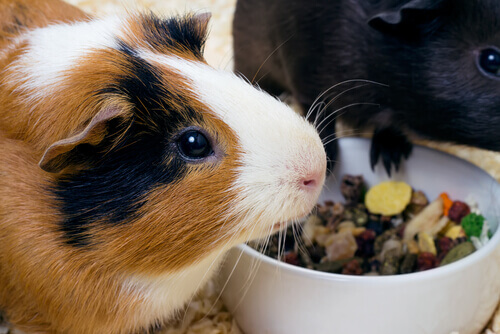The Importance of Proper Nutrition in Pets

Proper nutrition is one of the fundamental conditions owners must guarantee when it comes to their pets. In fact, it’s the main investment they’ll do on behalf of an animal’s long-term welfare. An adequate intake of vitamins, proteins, and carbohydrates is key to the immune system of any animal although there are many other benefits to it as well.
You must be aware of the specific needs of your pet though. Also, did you know that the nutritional requirements can vary within the same species bases on their age or sex? You must consider all of these in order to be able to plan the perfect diet for an animal.
Continue reading to learn more about the different benefits of a well-balanced diet in your pet.
Proper nutrition is key to animal well-being
All animals have basic requirements in order to lead a healthy lifestyle. We all need food, water, and sleep. In fact, these are the basic pillars of both our physical and emotional well-being. As you can see, we’re not that different from our pets. Here are some concepts to keep in mind when feeding yours.
Every species eats differently
It isn’t enough to know that an animal is a carnivore, omnivore, or herbivore. Animals often get sick because they have many nutritional deficiencies, especially exotic animals.
For example, guinea pigs need a vitamin C supplement to their diet. Many reptiles also require calcium and vitamin D in powder form and usually get it from their prey. Thus, it’s something owners must keep in mind when it comes to feeding them.

A sick pet can greatly benefit from proper nutrition
Many diseases require dietary management in order to delay their progression or even as treatment. For example, you can modify an animal’s diet for weight control, diabetes, kidney disease, allergies, food intolerances, and other digestive problems.
Poor nutrition based on leftovers, little variety, or excessive intake of fats can worsen any condition an animal might have.
Proper nutrition reduces your visits to the vet
Food is the basis of health. As you can imagine, a healthy pet requires fewer visits to the vet for any nutritional deficiencies that may have otherwise required medical attention.
Overly processed low-end food, the kind you find at the grocery store, promotes digestive illnesses, kidney problems, and oral infections due to the accumulation of tartar. This is due to its high concentration of minerals.
Of course, this doesn’t mean a balanced diet will prevent every single disease. This is because there are other determining factors such as genetics, environment, and natural predisposition.
Wholesome nutrition can definitely benefit your pet and reduce their probability of contracting diseases. The first step in maintaining a healthy immune system is to eat properly and be well-hydrated at all times.
Different ages, different sizes, different requirements
The same animal will have different levels of energy as they grow up and get older and thus their nutrient requirements will greatly vary during their lifetime. For instance, puppies need more calories and fat to grow while pregnant and lactating females require more nutrients for the proper development of their pups.
Adults, in contrast, need a wholesome, size appropriate, diet, and older pets need less energy and thus, specialized diets.
The proportions of proteins, fats, carbohydrates, and minerals also change besides the energetic contribution.

A balanced diet strengthens the animal’s immune system
A proper diet, one that’s well-balanced, helps strengthen the immune system. This is desirable because it’s the pet’s main defense against disease.
Many of the compounds that form the ingredients of their meal must contain antioxidants. These have anti-inflammatory and anticancer qualities that help maintain optimal body functions. Omega-3 and omega-6 fatty acids are just two examples of these nutrients.
Food is a positive reinforcement
Treats are a common educational tool, by using them we also communicate with our animals and strengthen our bond with them.
Positive reinforcement is key to teaching so you can use food, games, and even undivided attention to reinforce any action. The pet will eventually do it without a prize, but give them one anyway.
Proper nutrition slows down the process of aging
The antioxidant properties of foods delay cellular aging, which reduces oxidative stress. Vitamins and plants contain natural antioxidants that can neutralize the effect of free radicals. Therefore, any animal requires a well-balanced that includes a wide variety of fruit and vegetables as these contain lots of them.
You may not know it but there are antioxidant-enriched supplements for all types of pets.
Things to keep in mind when it comes to proper nutrition
As you read above, proper nutrition strengthens the immune system, helps alleviate symptoms of illnesses, and can even delay the aging process.
This is why we encourage pet owners to learn more about this subject. You’re responsible for adapting your animal’s diet according to their species, gender, age, and many other individual parameters. A specialist can help you design a plan that meets their nutritional requirements.
Thanks for reading.
All cited sources were thoroughly reviewed by our team to ensure their quality, reliability, currency, and validity. The bibliography of this article was considered reliable and of academic or scientific accuracy.
- McDonald, Edwards Grennhalgh y Morgan. Nutrición animal. Zaragoza, Editorial Acribia, 1995.
- Hand, Tharcher, Remillard y Roudebush. Nutrición clínica en pequeños animales. Buenos Aires; Panamericana, 2000.
This text is provided for informational purposes only and does not replace consultation with a professional. If in doubt, consult your specialist.